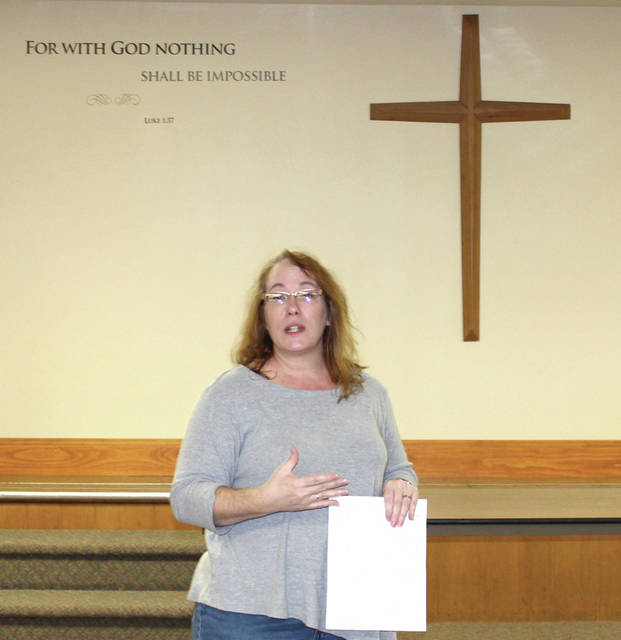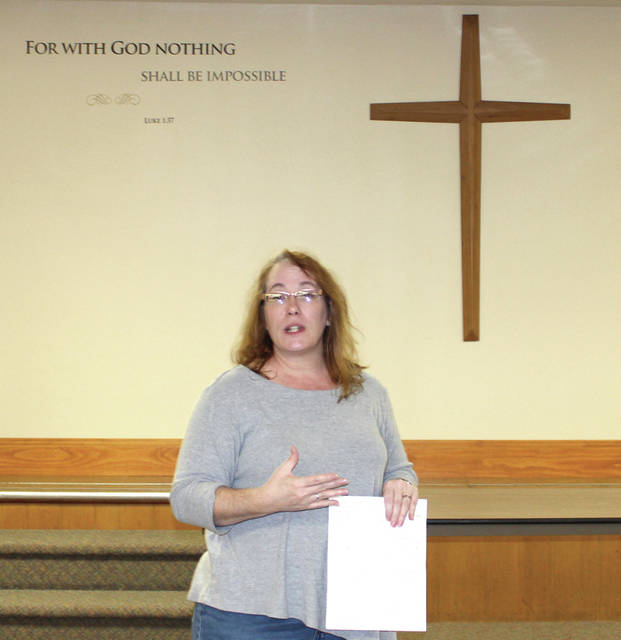

GREENVILLE — Trisha Feitshans said she did not go through “hell” for nothing; it has to mean something.
God had plans for me,” she said. “If you have been through something, and you don’t use that to help somebody else, then you went through it for nothing.”
The “hell” Feitshans is speaking of, was the abuse she and her family went through while living with her then ex-husband, who is still an alcoholic. She spoke about alcohol abuse at the Darke County Chapter Families of Addicts (FOA) meeting October 12, at St. Paul’s Lutheran Church, in Greenville.
“I am saddened everyday that my first husband does not get the help he needs,” Feitshans said. “He is still the father of my child. I have forgiven him for the damage he has done to me. I don’t think he understands over the years, the things he said and done. He brought me down to this very little racked – up damaged person, who had no self esteem, until the day I broke free. It was still scary. It took me about a year to really believe that I was free, and that he wasn’t coming back to get me; that I could support and take care of myself.”
According to the National Council on Alcoholism and Drug Dependence (NCADD), because alcohol use is legal and pervasive, it plays a particularly strong role in the relationship to crime and other social problems. Alcohol is a factor in 40 percent of all violent crimes today, and according to the Department of Justice, 37 percent of almost 2 million convicted offenders currently in jail, report that they were drinking at the time of their arrest.
Alcohol, more than any illegal drug, was found to be closely associated with violent crimes, including murder, rape, assault, child and spousal abuse. About three million violent crimes occur each year, in which victims perceive the offender to have been drinking. And statistics related to alcohol use by violent offenders, generally show that about half of all homicides and assaults are committed when the offender, victim, or both have been drinking. Among violent crimes, with the exception of robberies, the offender is far more likely to have been drinking than under the influence of other drugs, according to NCADD.
Feitshans said she became co-dependant with her ex-husband.
“Co-dependency is an addiction,” she said. “You become addicted to controlling that person’s behavior. For me, I tried to manipulate the money, so I could control how much he drank. I hid money in the checking account, so he wouldn’t know how much we had. If he didn’t behave in a way that I needed him to behave, it caused me great distress. I was feeling that I was somehow controlling him. For example, if only I do this – he won’t drink; or because I did this – it made him drink. They will respond to that and use you. It becomes an obsession for you.”
Another element involved in Feitshans’s ex-husband’s alcoholism was enabling. She said friends had stashes of alcohol in their homes for him, even those who did not drink.
“Enabling is when you help them accomplish what they are doing: buying them a six pack, knowing when you give them $20 for gas they will buy alcohol, and you pay their fines, so they don’t have to be responsible for what they have done.”
But maybe one of her worst experiences, was waiting for a knock at the door in the middle of the night.
“He was driving drunk all the time, and I got tired of fighting with him not to drive drunk,” she said. “I became very anxious and fearful of the knock in the middle of the night, not only for him, but that he hurt someone else.”
One FOA guest asked, “I don’t feel that I would like your ex-husband. How can I, as a member of the Christian church, help him?”
“The best way is to work through groups like this, or mentorships like Hope in Recovery,” she said. “For the person that has not admitted he is an alcoholic, like my ex-husband, the best thing you can do is to just try to be there and give them some guidance. It is very complicated; you cannot go into that relationship and jerk them out – they will just go right back. But you can press upon them different ideas to help. It is heart-breaking for me to go back at that time and remember.”
Feitshans works with recovering addicts at Hope in Recovery, in Greenville. For more information, call 937-621-4297. Heather Lawson is the new director of FOA Darke County. FOA meets every Thursday, 7-8:30 p.m., at St. Paul’s Lutheran Church, 131 E. Fourth Street, Greenville.
EDS NOTE: This story is part of an ongoing series titled “Fatal Addiction” that will address the drug problem and effects on residents and resources in Darke County.





